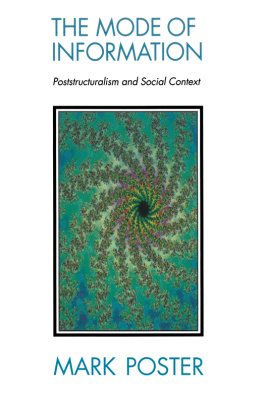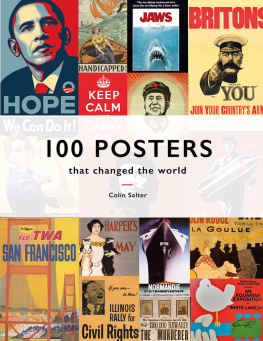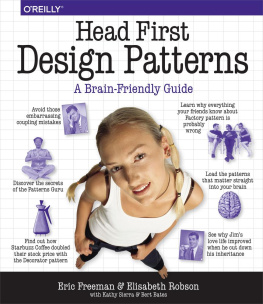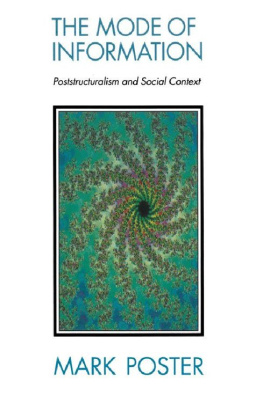The Mode of Information
Poststructuralism and Social Context
Mark Poster
Polity Press
Copyright 1990 Mark Poster
First published 1990 by Polity Press in association with Blackwell Publishers Ltd.
Reprinted 1992,1996, 2004,2007
Polity Press
65 Bridge Street
Cambridge, CB2 1UR, UK
Polity Press
350 Main Street
Maiden, MA 02148, USA
All rights reserved. Except for the quotation of short passages for the purposes of criticism and review, no part of this publication may be reproduced, stored in a retrieval system, or transmitted, in any form or by any means, electronic, mechanical, photocopying, recording or otherwise, without the prior permission of the publisher.
Except in the United States of America, this book is sold subject to the condition that it shall not, by way of trade or otherwise, be lent, re-sold, hired out, or otherwise circulated without the publishers prior consent in any form of binding or cover other than that in which it is published and without a similar condition including this condition being imposed on the subsequent purchaser.
ISBN: 978-0-7456-6821-5 (Multi-user ebook)
A CIP catalogue record for this book is available from the British Library.
Typeset in 10 on 12pt Sabon
by Photo graphics, Honiton, Devon
Printed and bound in Great Britain by Marston Book Services Limited, Oxford
For further information on Polity, visit our website: www.polity.co.uk
For Jamie
Contents
1 The Concept of Postindustrial Society
Bell and the Problem of Rhetoric
2 Baudrillard and TV Ads
The Language of the Economy
3 Foucault and Databases
Participatory Surveillance
4 Derrida and Electronic Writing
The Subject of the Computer
5 Lyotard and Computer Science
The Possibilities of Postmodern Politics
Acknowledgements
The position I develop in this book evolved over a period of several years. During that time many colleagues and friends participated in that process by their comments, suggestions, criticisms, encouragements, warnings. I thank the following people for that help and for reading various parts of the manuscript: David Carroll, Andrew Feenberg, Rob Kling, Tania Modleski, Leslie Rabine, John Rowe, Gabriele Schwab, Martin Schwab, Miriam Silverberg, Jonathan Wiener. Robert Sieber helped me with the research on the discipline of Computer Science that is discussed in chapter 5. In the course of presenting the material in this book at various institutions I received helpful responses from many persons. For their interest and concern I thank them. I benefited greatly, as I have for the past decade, from the work of the Critical Theory Institute at the University of California, Irvine, and this not only by its financial support but also by the responses to my work by its members. A University of California Presidents Research Fellowship in the Humanities allowed me the time to bring this work to its conclusion. Students in the History Department and the Emphasis in Critical Theory at the University of California, Irvine were helpful in their skepticism, enthusiasm or critique of my ideas. Part of the introduction is appearing in the journal October, 54 (Winter 1990) as Words without Things: The Mode of Information. Part of chapter 3 appeared in Discourse, 12(2) (SpringSummer 1990) as Foucault and Data Bases. An early version of part of chapter 4 will appear in The Subject of the Computer: Derrida and Electronic Writing, in Jos Lambert, ed., Literature and Technology (Baltimore: Johns Hopkins University Press, forthcoming).
Introduction
Words without Things
A relatively thinly populated country, with well-developed means of communication, has a denser population than a more numerously populated country, with a badly-developed means of communication; and in this sense the Northern States of the American Union, for instance, are more thickly populated than India.
Karl Marx, Capital
An increasing segment of communications is mediated by electronic devices. People watch television, make phone calls, listen to the radio, go to the movies, use computers, fax machines, VCRs and stereos. Such communications occur in every institution and in every social group. Politics, work, consumption, the family, the military, the church, education, leisure activities in varying degrees all employ electronic mechanisms in their communications. In each instance, symbols are exchanged, messages are sent and received, information is retrieved just as they have been since human beings began using language. And yet something has changed as well. Electronic communications are new language experiences in part by virtue of electrification. But how are they different from ordinary speech and writing? And what is the significance of this difference? This book explores these differences and in particular considers various theoretical perspectives that might be useful for opening new interpretive strategies for critical social theory in relation to these differences.
Some observers argue that the introduction of electronic devices makes no substantial difference in the nature or consequence of a communication. The politician who speaks in a TV ad campaign still attempts to gain votes according to the rules of constitutional democracy. The worker who uses a computer to control an assembly process or type a letter is paid for his or her labor as in the past according to the contract of employment. The consumer who watches a TV merely gains information about products that might be bought in a store, much like reading a newspaper. The soldier who uses a computer to guide a projectile to its target, like the archer who visually aims his arrow, is practicing the art of destroying the enemy. The electronic device simply increases the efficiency of the communication in question. From this perspective language appears as a tool for the purposes of acting human subjects, clearly subordinate in importance to the positional intentions of individuals in determinate institutional frameworks.
Nor do electronic devices nullify the theories that explain the nature of communications. To a Marxist, new communications devices fall within the thesis of the class struggle: increased access to information occurs differentially in relation to ones position in the class structure. To neoMarxists, electronic media reinforce the culture industry, heightening the hegemonic force of ideology. To an economist, the laws of the market determine who shall use a computer, who shall advertise on television, who shall have their songs broadcast to radio receivers. To a Weberian, electronic communications increase the differentiation of society into subsystems and promote the power of bureaucracy. To a liberal they are subject to the contest for power among pluralist factions. Even for technological determinists, nothing is new: electronic media confirm the progress of the proliferation of machines that alleviate toil and subordinate nature to the wishes of mankind. Regardless of ones theoretical perspective, the conclusion appears incontrovertible that with the introduction of electronically mediated communication nothing basic has changed.
These perspectives all recognize and account for one sort of modification introduced by electronic communications: the exchange of symbols between human beings is now far less subject to constraints of space and time. In principle, information is now instantly available all over the globe and may be stored and retrieved as long as electricity is available. Time and space no longer restrict the exchange of information. McLuhans global village is technically feasible and as such has important consequences that call into question the adequacy of existing theories and positions. The electronic reproduction of scenes from Vietnam into American homes in the late 1960s had stunning impact on politics. The capture of a government television station by the Philippine rebels in 1985 and their subsequent broadcasts reassuring the population of their success materially affected the fate of the Marcos regime. The recent introduction of direct retailing on television portends a revolution in the marketing practices of consumer goods. The apprehension of suspected criminals by clues provided through the computer analysis of fingerprints affords a new level of information to law enforcement agencies. The prospect of instant universal information, introduced by electronic media, clearly has profound effects on society, the extent of which are still to be determined. But the conquest of space and time by electronic media augurs more for institutions and for theory than a mere retuning of practices and ideas to new communicational frequencies.
Next page










